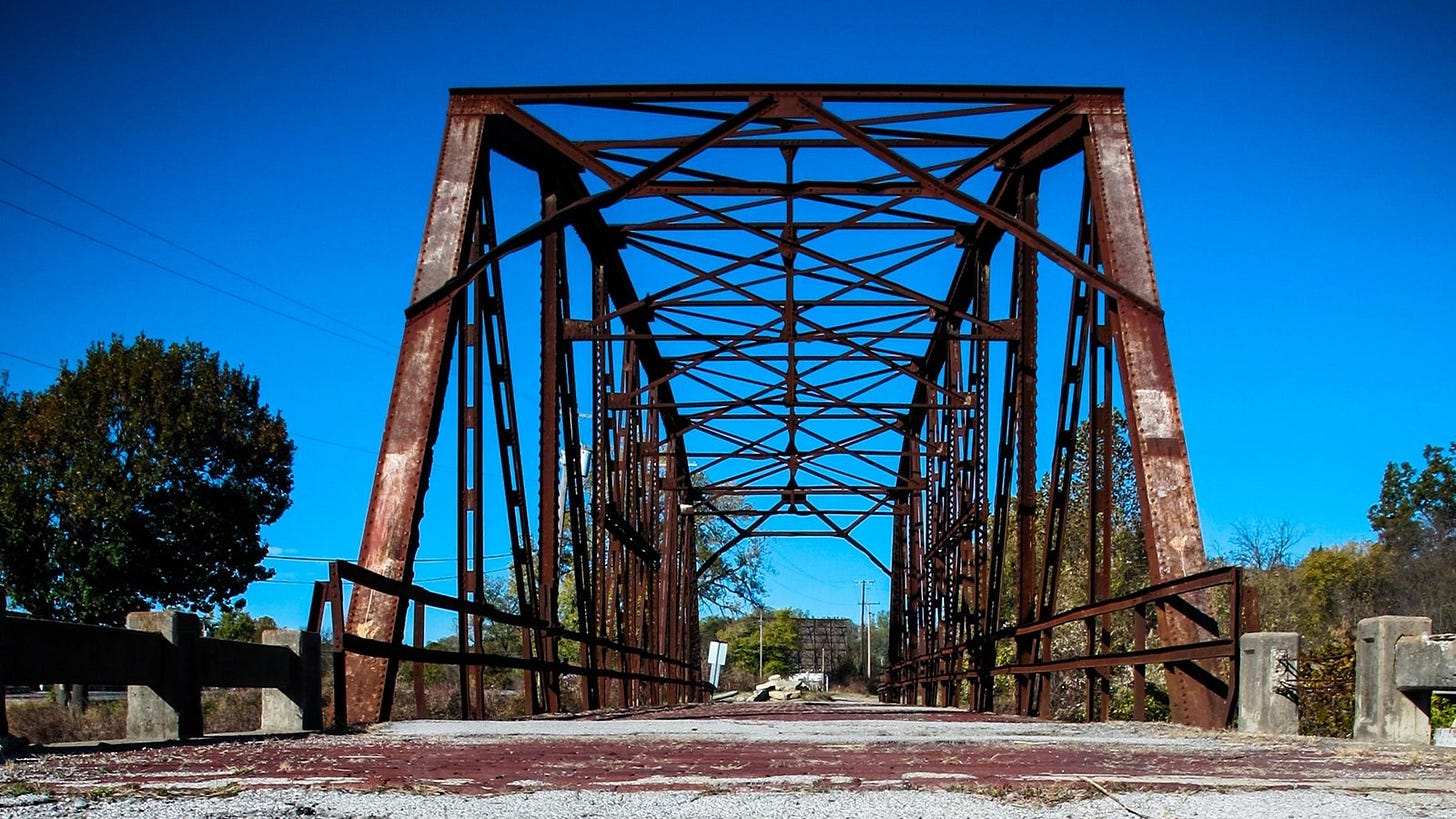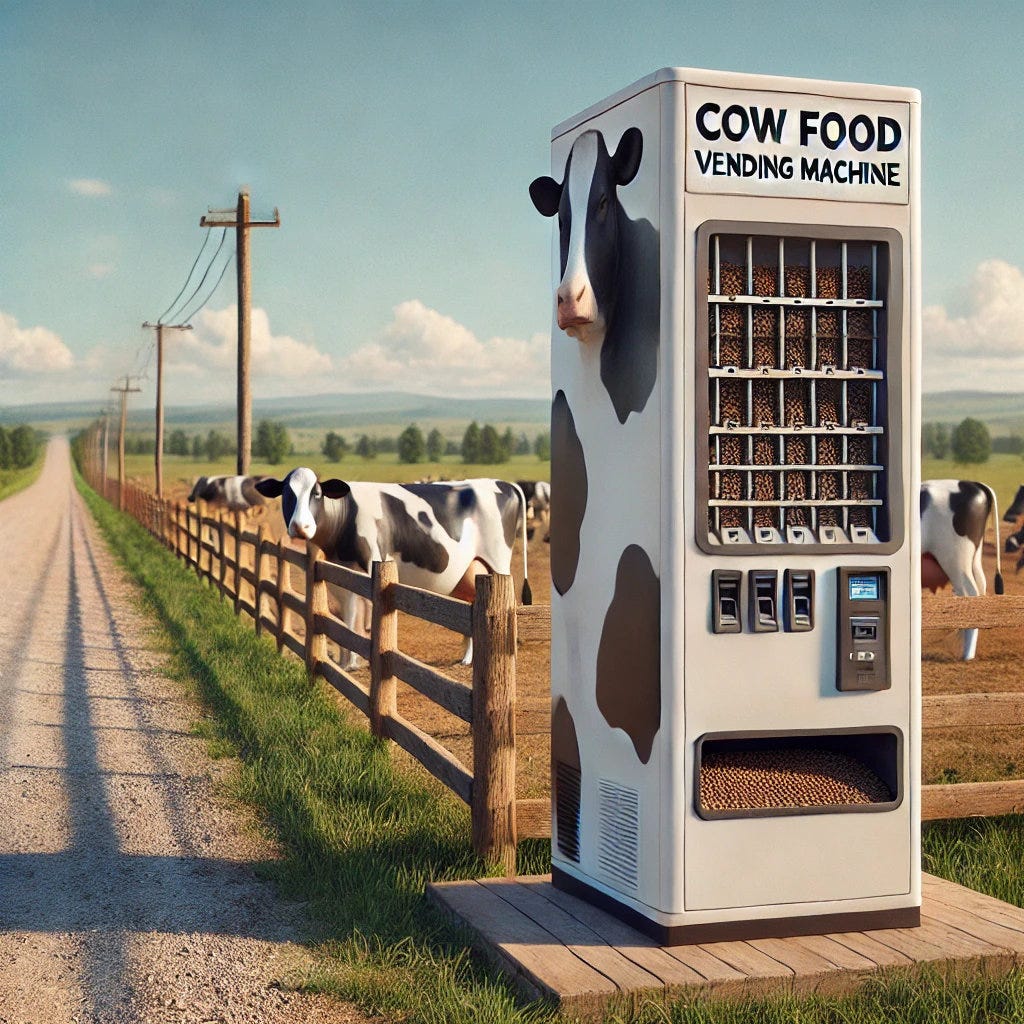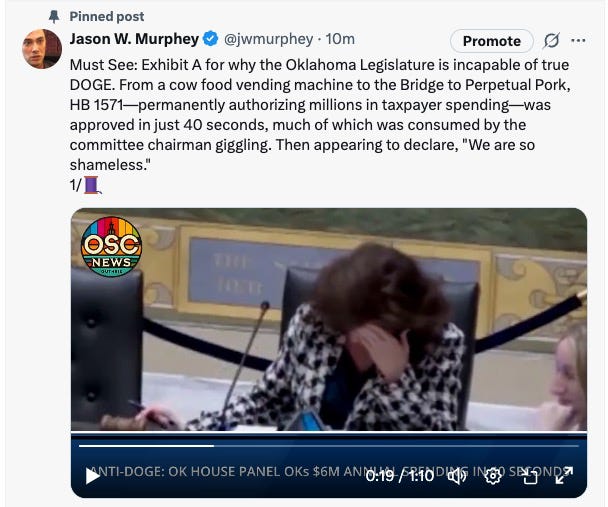When the Oklahoma House Fails to Deliberate, the Cow Food Vending Machine and The Bridge to Perpetual Pork Win
In the latest example of "These are not serious people," it takes a House Committee just 40 seconds to give eternal life to a new state commission and its six million dollars of annual spend.
Readers might recall earlier this year when House Speaker Kyle Hilbert and his leadership team instituted a massive new committee structure—a structure that double-assigned bills to two separate committees. Those leaders justified this structure by declaring it would bring a new level of "deliberation," a word that is hardly fitting for a House of Representatives that, since its 2018 purge of many of its most conscientious and conservative members, has been devoid of any form of true public deliberation.
In the House, true deliberation rarely occurs in the committee rooms because committee chairmen decide—behind closed doors—whether legislation will live or die. Once a chairman gives a bill the thumbs up, it is almost certain to pass. Instead, the new double-assigned structure created a two-tier safeguard by which good bills could be filtered out, and the blame for killing them could be distributed rather than falling solely on the speaker and his floor leader, who otherwise would have to kill the bill themselves by denying it a floor hearing, even after it had passed its oringal committee assignment.
Allow me to direct you to Exhibit A of how this "deliberation" actually occurs in the House of Representatives. This clip, just a few seconds long, covers the entirety of the House Tourism Committee meeting on Feb. 17.
If you are interested in seeing first hand how very dysfunctional the house has become, then this is a must watch.
It took the committee just 40 seconds to sign off on House Bill 1571. The author wasn't afforded the opportunity to explain the bill before being interrupted by a committee member, known as Dale Kerbs of Shawnee, who appeared extremely anxious, for whatever reason, to pass the bill without a public explanation. His motion was immediately seconded by a minority committee member, who beat out the only other present member as he tried to get in his second as well—all of this before the author of the bill could offer more than a single word of explanation.
This set the chairman, the notoriously not-so-serious Tammy Townley—whom you may remember from this publication's first-ever article—into a fit of giggling before declaring the vote and appearing to add her own astute commentary: "We are so shameless." If that's in fact what she said, a more accurate statement may never have been uttered by a House committee chairman.
One might think that the legislation at the center of this big joke was inconsequential—not that it would make the behavior excusable—but it most certainly was not.
While Oklahoma politicians stumble over themselves to claim the mantle of DOGE master, this bill granted eternal life to a new government agency: the Route 66 Commission. The agency was created in 2022 by since-defeated Rep. Kevin Wallace, as a temporary state commission for promoting Route 66—a mission that, if necessary, could have been easily carried out by any number of Oklahoma's many already-existing agencies, boards, or commissions. The new commission was originally set to expire in 2027, but as President Reagan so accurately pointed out, nothing on earth comes closer to eternal life than a new government bureaucracy. Having gotten their foot in the door of bigger, more expensive government, Oklahoma politicians weren’t about to pull out. Instead, with this new bill, they removed the 2027 expiration date, ensuring that Oklahoma will forever celebrate Route 66 with yet another perpetual spending program and another forever agency.
This means the commission will keep its grasp on up to $6 million in "off-the-top" money. Off-the-top money is especially dangerous because it is collected outside the legislative appropriations process. Instead of being allocated through the standard budgeting process, it is simply skimmed off sales tax collections and distributed to government agencies for further distribution—without any ongoing legislative oversight.
Had the committee members possessed even the most modest of self-awareness to insist on a pretense of deliberation, here are some of the questions they might have asked the bill’s author:
Committee members could have asked the author about his judgment in authoring this bill. If anything has better defined the House of Representatives in recent years than its lack of deliberation, it is the self-dealing among its members. Just last year, a lame-duck representative actually had to take constitutional privilege on his own bill. It’s literally that bad. When newly elected Attorney General Gentner Drummond let a legislative lieutenant and close friend of the imperial speaker, Charles McCall, off the hook after being charged by the Oklahoma County district attorney for self-dealing, it sent a powerful message: self-dealing was now the order of the day. It’s a subject we need to explore in future writings.
In the case of House Bill 1571, the legislative author's employer, the City of Sapulpa, appears to be a potential recipient of two million dollars funneled through this program—much more than enough to offset the salary paid to the moonlighting legislator.
One of that town’s potential projects for this money? A bridge—part of their $2 million project—that is not open to vehicle traffic and hasn’t been used by highway traffic since 1952. It certainly brings to mind how Sen. Tom Coburn exposed the infamous "Bridge to Nowhere," but as bad as that was, at least the Bridge to Nowhere was accessible to vehicles. Considering the circumstances of this bill, perhaps The Bridge to Perpetual Pork would be the best-fitting moniker.

There are numerous specific expenditures that should have been questioned by committee members. For example, $35,000 allocated to renovate a dilapidated sign that appears to sit outside a privately owned residence. If the property owner isn’t willing to spend their own money to renovate the sign, why should taxpayers be forced to do it?
Public funds used for improving private properties is a common theme of this program. Another $179,000 project purports to encourage the revitalization of the facade and/or signage of numerous private businesses such as the Indigo Blue Party Store in Weatherford, DJ's Rental and Sales in Elk City, and Devins C-Stores in Foss, among others.
Another project of note is a nearly $500,000 proposal that includes a wide-ranging set of initiatives so broad that accountability will likely be difficult to quantify. Among its components? The creation of a cow food vending machine. Kudos to the innovative persons behind this very creative proposal: getting gullible road siders to pull off and potentially pay to feed the cows—the logistical mechanics of which are funded at government expense, i.e., you and I, the taxpayers. Pure genius.

Had there been a serious-minded member of the committee, they might have asked the author: "Why should taxpayers in Guthrie be forced to fund a $35,000 sign on private property in Erick or a cow food vending machine in Hydro? In a just world, wouldn’t those communities foolishly throw away their own money without burdening the state’s taxpayers, who are already heavily punished by government-generated taxation and inflation?
Or, committee members could have used this opportunity to examine the future damage to Route 66 tourism caused by the massive wind farm developments in the Arcadia area. Legislation to impose a moratorium on the green energy invasion destroying rural scenery across the state was bottled up in committee and denied a hearing. We all know the uncomfortable reason for this, and this bill would have given committee members the chance to address that issue head-on.
But, in an ironic twist, in one of its more wasteful moments, this commission is actually using $25,000 of your taxpayer dollars to fund the creation of a non-functional, decorative wind turbine in Warr Acres—a turbine that will no doubt be quickly enhanced through the creativity of the area's graffiti artists with accompanying gang territory denotations.
Or, again, had they cared about the pretense of deliberation, committee members could have pointed to the self-described intent of so many Oklahoma politicians who claim they want to rein in government spending with DOGE and asked: “If we are really serious about DOGE and reducing government spending, isn’t it counterproductive to give eternal life to a program that takes up to $6 million in taxpayer money every year for projects like Sapulpa’s infamous Bridge to Perpetual Pork that isn’t even open to vehicle traffic?”
All of this is a departure from the course set by the first generation of majority Republicans. Many of us at that time understood the importance of both enhancing legislative transparency and creating a deliberative process. We also prioritized shrinking the size of government. We measured success by how many agencies, boards, and commissions we consolidated or eliminated—and we endeavored not to create new ones.
Both of these defining principles have long since been abandoned by a large number of the second generation of majority Republicans. This is a group adrift, without a declared direction backed by defining principles. There is no limit to the values they will betray as they create new government programs and spend at a rate that people have never seen before.
It is almost impossible to keep up with.
But stay tuned to this publication, because we are going to give it a try.
And if this footage shocks you, as it rightly should, then your instincts are well-calibrated. Perhaps it’s time to step up and do your part to set things right by challenging or recruiting and supporting someone who is challenging your co-opted incumbent in the 2026 election cycle.
If you haven’t yet subscribed to this publication, much more content like this is planned. Visit oklahomastatecapital.com/substack to subscribe.







I have to ask, was Rep Tammy Townley drunk or is she always as goofy as a pet raccoon?